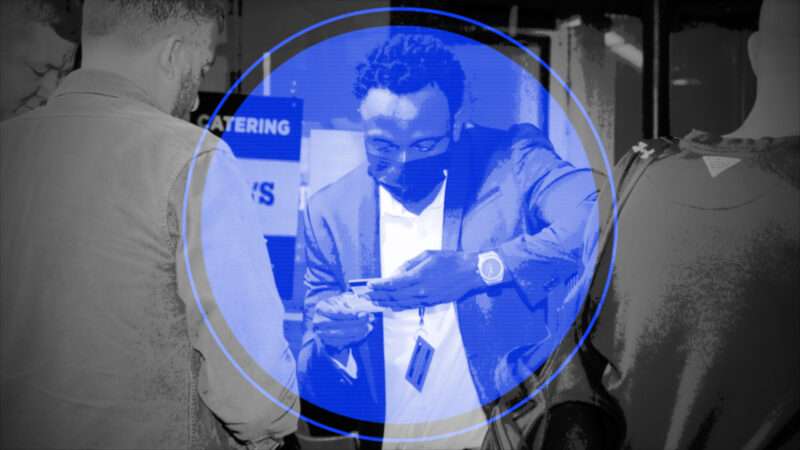
Amid the ongoing debate about COVID-19 restrictions and when to lift them, an interesting argument has emerged among certain members of the chattering class—one where the entire discussion is already obsolete because the restrictions under discussion don’t actually exist. To mention the notion of returning to normal is to be met with incredulity: “What do you mean, ‘back to normal’?! We’re already there!”
It’s a glimpse into another world, one where it’s possible to forget COVID even exists unless you happen to turn on the news. A world of shuttling kids from gymnastics class to birthday parties, of weekend trips to the zoo, of languorous Sunday brunches with family and friends. Alex Pareene, writing on Substack, describes the idyllic view from there:
For $107 I could book a flight to Bermuda this weekend. The Knicks lost at home yesterday; a fan was spotted at the game watching The Office on mute. Vietnamese restaurant Que Viet, a Minneapolis mainstay famous for the giant egg rolls on a stick it sells each year at the Minnesota State Fair, is opening a St. Paul location. The number one movie in the country is Scream.
It all seems very normal.
It must—and it all sounds very nice. It’s no surprise, under the circumstances, that a person living in this world might write an essay with the title “We’re all trying to find the guy policing our behavior,” the obvious implication being that the guy doesn’t exist.
If you’re a small business owner or a service worker tasked with enforcing COVID-19 restrictions, it’s a lot easier to find the COVID police: You just have to look in the mirror.
“What most of the restrictions on our behavior (and the behavior of most other Americans) have in common is that they are not being imposed on us by power-grabbing authority figures,” Pareene writes. It’s a fascinating statement, true from certain angles while also being fundamentally detached from reality. Mask mandates, vaccine passports, and other restrictions are being imposed on us by authority figures, but those government authorities have delegated enforcement to individual citizens.
It’s a sneaky sleight of hand. The authorities hide behind the curtain, making the rules (and inflicting punishment on those who don’t follow them). But the face of the restrictions, the one people spit in when they’re angry about the disruption to their lives? That’s your restaurant manager, your flight attendant, your minimum wage cashier.
Not everyone thinks this is a bad thing. Some people—the Brooklyn bouncer who reportedly turned away a patron for being vaccinated with an inferior brand, the flight attendant who’s just a little too stoked about banning two-year olds who don’t wear their masks correctly—are all too happy not just to wield this power but to abuse it. But for those of us who never wanted to play cop, being essentially blackmailed into the role is not just a constant reminder that things are far from normal; it’s an endless source of stress.
I include myself in this category. I teach group fitness classes in a town with a mask mandate, and enforcing it is both exhausting and infuriating: persuading people to put their masks on, assuaging the clients who freak out if someone’s mask slips below their nose, worrying that the city will fine my boss into oblivion if I can’t get a room full of vaccinated adults to keep their faces covered during an hour of vigorous exercise even though the cloth masks we’re wearing for the sake of compliance are, per the CDC, not especially effective. When people ask, “Who is policing your behavior?,” I want to scream: “It’s me! I am! I hate it!” The mayor of my city has thrust me into the role of the Mask Police whether I want it or not.
This isn’t a new development, but rather the leveraging of an impulse that’s been prevalent throughout the pandemic. People have been surveilling and snitching on each other, almost recreationally, since the first lockdown went into effect. The idea of reporting your neighbors for noncompliance is not just becoming normalized; it’s a way that people who have been left feeling hopeless and helpless by the events of the last two years can feel, at least briefly, as if they’re in control of something. The enthusiasm for such measures isn’t limited to blue states, or for that matter to pandemic policies. Consider the new Texas abortion law, which was explicitly designed not to be enforced by DAs or police but by private individuals with the time and inclination to interfere in other people’s lives.
This is the catch-22 of having power during the pandemic. The authorities who impose these mandates are being screamed at every day to do something to combat the spread of a wildly contagious virus that, realistically, they can’t do a lot to contain. So they do something, but they don’t want the blowback if the something doesn’t work. If case rates in my town keep rising despite the mask mandate, nobody will ever admit that the policy was flawed; it’ll just be blamed on the individuals who didn’t comply, and on the service workers and small business owners who didn’t make them comply.
When ordinary people do the dirty work of enforcing the rules, the people who made those rules get to maintain the illusion of clean hands—aided by the narrative that nothing about this is abnormal at all, that there’s nothing to see here, that this is how things have always been.
The post We All Are COVID Cops Now appeared first on Reason.com.
from Latest – Reason.com https://ift.tt/35nkQ7X
via IFTTT